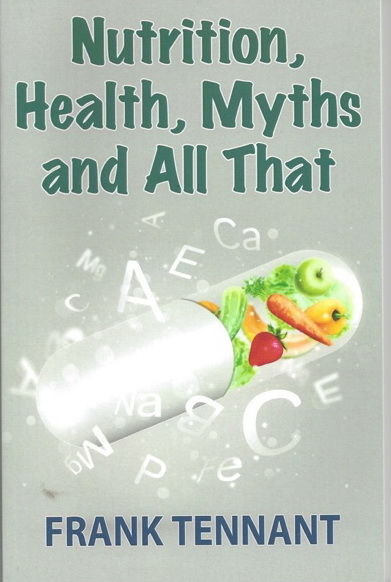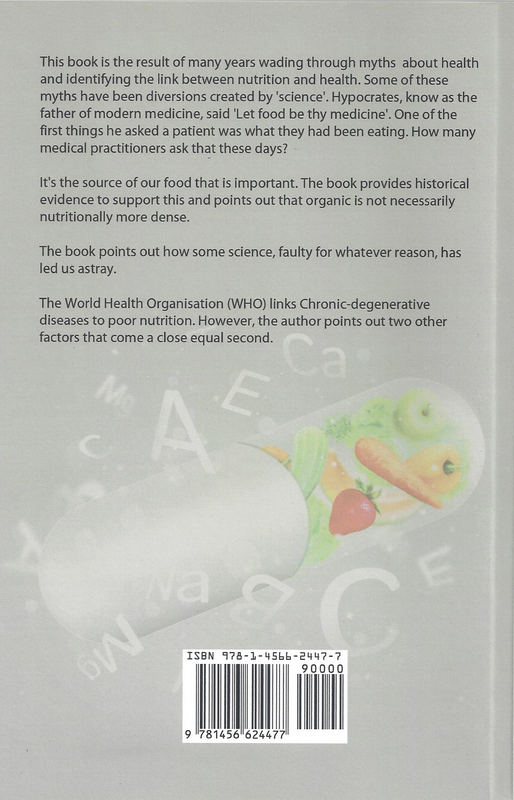Nutrition, Health, Myths & All That
Bamboozled by Science‘Nutrition, Health, Myths and All That’ is the result of many years wading through myths about health and identifying the link between nutrition and health.. The low fat diet had been heavily promoted and accepted for many years when it was announced that the nation was suffering from an obesity epidemic. So obesity was indirectly caused by the low fat diet. Some myths, as highlighted in 'Nutrition, Health, Myths and All That', have been created by poor science. The more I learnt about the subject, the more common sense seemed to be lacking. The earlier pioneers in nutritional health were more practical in their approach than those relying on pure science to analyse specific nutrition areas. In the late 1950’s, as an Agricultural Science student, I had worked with one of these pioneers who explained the links between a healthy soil, healthy plants and healthy humans and animals. Years later I came across statistics to show that the incidence of cardiovascular diseases and cancer had increased dramatically since the advent of the low fat diet. The consumption of red meat, a major source of saturated fats, had dropped by 40%, butter consumption had plummeted and, since the promotion of the low fat diet, supermarket shelves were full of ‘lite’, low fat foods. The consumption of saturated fats had dropped yet the cardiovascular diseases they were meant to reduce had increased. At the same time the consumption of vegetable oils and soft drinks had soared. These were causing serious health issues. Yet the continuing advice was to reduce our consumption of saturated fats; this was irrespective of the fact that we never had an obesity epidemic or such a high incidence of cardiovascular diseases or diabetes before the low fat diet was introduced. When I recently saw a cardiologist’s letter advising his patient to stick to a low fat diet and avoid salt I realised the truth of Proust's dictum: "A new scientific truth does not triumph by convincing its opponents and making them see the light, but rather because its opponents eventually die, and a new generation grows up that is familiar with it”. The World Health Organisation (WHO) has not been able to find a single disease that is not linked to nutrition. However, I point out three other factors that come a close equal second. Hypocrates, know as the father of modern medicine, said 'Let food be thy medicine'. One of the first things he asked a patient was what they had been eating. How many medical practitioners have the time to ask and think about that these days? For twenty years I edited a monthly news sheet which dealt mainly with nutrition and health issues. This maintained my interest in the area and formed the basis of some sections of the book. In pithy summaries the book covers many areas of nutrition and health. It covers the credibility of experts, food manufacturing, agricultural practices, legislators, food preparation and predicts some future trends for health. The book provides historical evidence to support that it's the source of our food that is important and explains that organic is not necessarily nutritionally more dense. In the end the author points out that it's up to the individual to assess the information, use some common sense, and make their own decision as to where they should source their foods and what lifestyles they and their families should practice in order to contribute to their optimal physical and mental health. The information in ‘Nutrition, Health, Myths and All That’ gives the reader a background for making such decisions. About Frank Tennant, the Author of ‘Nutrition, Health, Myths and All That’ When studying Agricultural Science over 50 years ago I spent a year working on the farm of Friend Sykes one of the first 'organic farmers' - he was then in his 70's and was finishing his third book. He was an advisor to many estates in UK, South Africa, South America and Australia. He was one of the founders of the UK Soil Association with Lady Eve Balfour. That experience started my thinking about the importance of the source of foods; although it was only about 30 years ago that I started to take a real interest and begin to understand what the early pioneers were really talking about. After completing my studies in UK I drove through Africa for a year with a view to checking out the farming options in some of those countries. One of my assignments during that time was to record some interviews for a BBC Rural Programme. I continued on to Australia and there spent my first two years on the land. I then joined a company where I was able to advise farmers and from there drifted into marketing and management but for many years was still associated with the land. In the 1990's I started a monthly news sheet for a business association. This sheet was focused on health related products and encouraged my further reading. A couple of years ago, with my leg in plaster for ten weeks, I decided to pen a summary of what I had gleaned. 'Nutrition, Health, Myths and All That' is that summary. |
|

